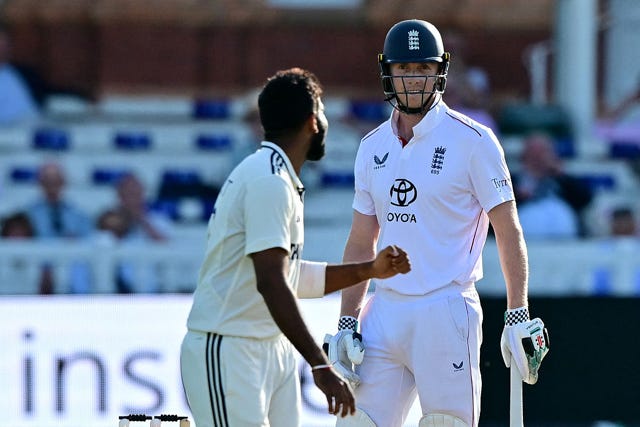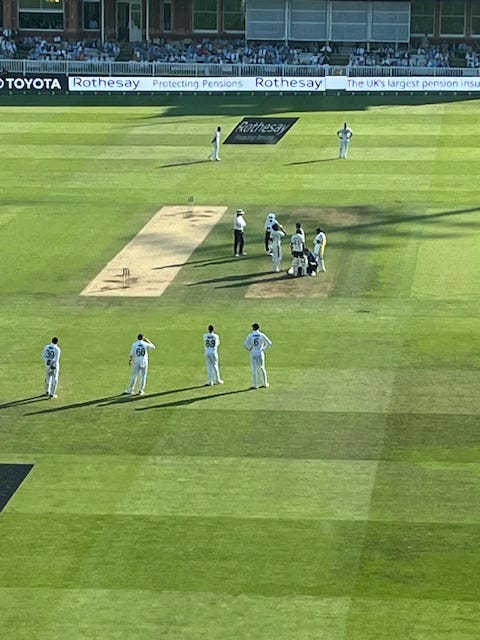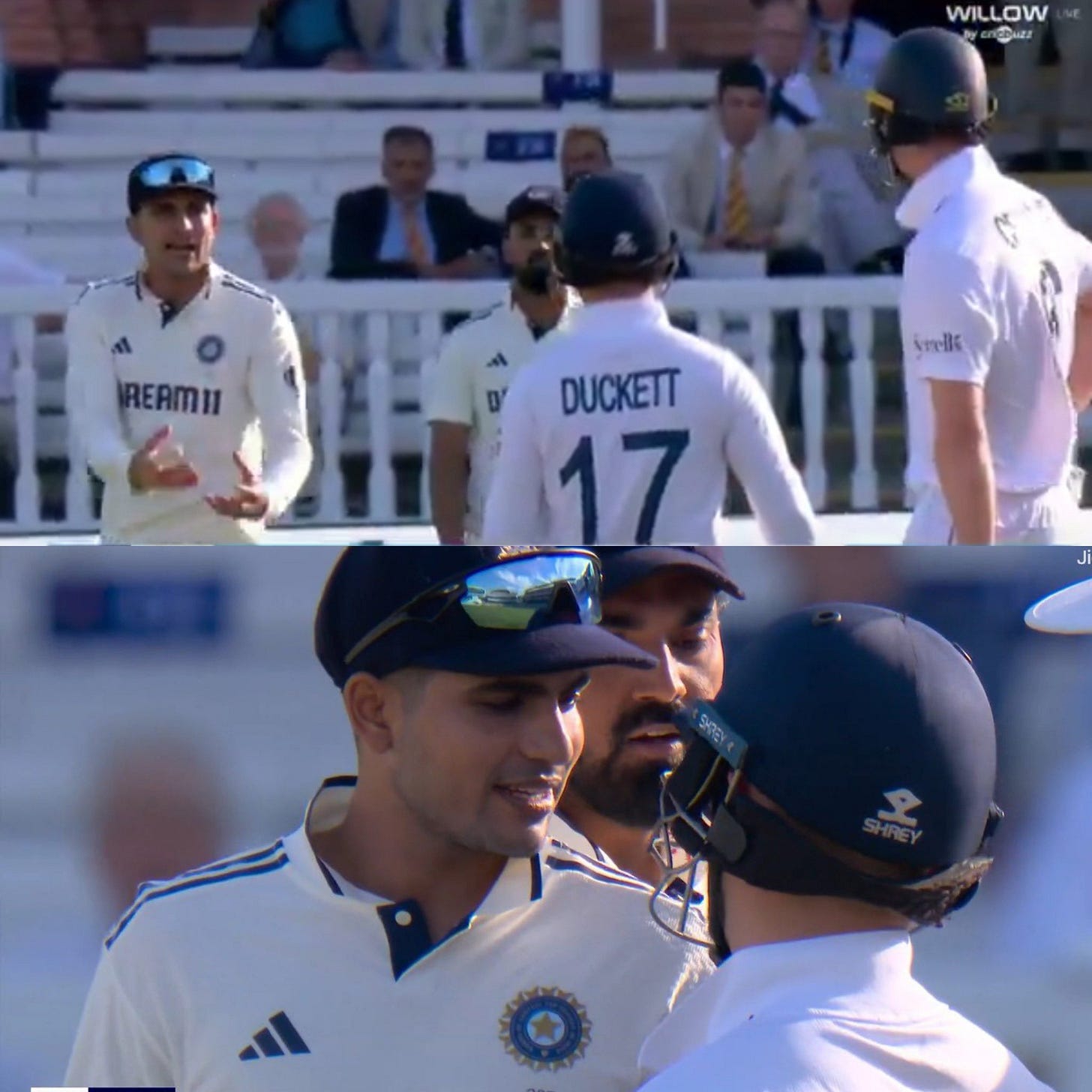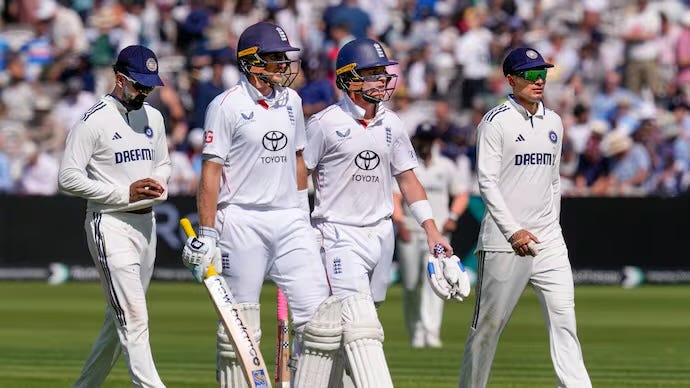Talking points have not been in short supply during a series which was always going to be high on octane but the most obvious, outside of runs and wickets, has been the curious and often comical absence of control by the match officials. The players run the game the way they choose and there is, apparently, nothing the umpires can (or will) do to change that.
The sledging has been excellent, peaking with Shubman Gill’s “grow a pair of fucking balls” to Zak Crawley for wasting four minutes at the end of day four to restrict India to just one over before the close. Crawley’s partner, Ben Duckett, wasn’t far behind with his “you spent 15 minutes on your back having a fucking rub down in the middle of the game, pal…”
This ‘banter’ has been an integral part of Test cricket for over a century – for those who play it. I’m not sure we should be sharing it, but while stump microphones offer us an invitation to eavesdrop the players’ less discrete thoughts and comments, I’m happy to accept. Although I did edit out a couple of extra words from those above.
The words aren’t the problem, and even the briefest shoulder contact between Mohammad Siraj and Duckett after his dismissal can, at a push (haha) be overlooked by Match Referee Richie Richardson if he’s generous with his acceptance of ‘heat of the moment’ conflict, but the deliberately gratuitous time-wasting should never be ignored.
Gill’s sudden need for physio to his back was caused by KL Rahul’s absence from the field for over 10 minutes while England were nine wickets down. He needed to ‘repay’ those minutes on the field in order to open the batting. So Gill ‘bought’ them, shamelessly and unapologetically. And without the slightest challenge from the umpires.
Match officials – the umpires – were once in control inside the boundary ropes. When players abused the regulations or ‘pushed the boundaries’ they would step in. An unauthorised incursion onto the field by a 12th man in between overs and statutory drinks would incur an outburst of wrath from the white-coats: “Get off my bloody field, and stay off it, and you little mongrel,” Dickie Bird once yelled at an unsuspecting drinks-bearer attempting to relay a dressing room message.
Sir Alistair Cook described the loss of 15 overs on the second day of the Lord’s Test as “unacceptable” and “a new low.” There were extra, official drinks breaks because of the heat and various other, unscheduled breaks but the majority of the lost time was a result of the petty, tit-for-tat revenge time-wasting which is taking place in the series, exacerbated out of control by the flagrancy of Gill’s massage.
“You can’t blame the players, it’s up to the umpires to be stricter in controlling the pace of play, the players will always push the boundaries. As a captain you’re aware of the over-rate but what’s happening in the game is always going to be more important,” Cook said on the BBC.
The notion that cricketers might take responsibility for their own behaviour, the profile of their sport, and their duty to provide ticket buyers with the content they have paid for, may too much for the modern player to grasp. “I’m going into this nightclub and I cannot be held responsible for my behaviour in three hours’ time. It is up to the bouncers to ensure that nobody is harmed and I reach home safely.”
Paul Reiffel, Chris Gaffaney and Sharfuddoula Saikat have stood on field during the first three Tests and they have stood over the protracted stoppages in the manner that a jogger might survey the potential damage to a cyclist who has slipped off his bicycle. Potentially willing to help if a life is at stake, but otherwise happy not to intrude.
They know, ‘theoretically’, that they can intervene but, well, you know, this is England against India. It’s a very big gig. There are post-series captains reports to consider, the consequences of which can be ‘trouble-maker’ labels and banishments to T20 World Cup Oceania Group Two Qualifying tournaments in Singapore.
The intensity Test cricket is what we all crave, the burning desire to succeed in the hardest and most rewarding format which has ever existed. Alistair Cook is probably right. Maybe we can’t expect players to behave with decorum and discipline after six hours, or four days, of painful and exacting competition. In which case, ways need to be found to re-empower the umpires to do that.
Players are taking the piss out of the game they love, exploiting loopholes and making it suit them – not spectators or viewers who ultimately pay for their increasingly comfortable lifestyles.









Hey Manners,
I think the umpires of today's day and age don't command the same sort of an aura amongst the players as a certain Dickie Bird, David Shephered, Steve Bucknor, Venkat Raghavan. They are timid becatof their own filed calls being questioned and overturned frequently.
https://open.substack.com/pub/thepavilionend/p/a-spectacle-for-spectators?r=48gx3i&utm_medium=ios